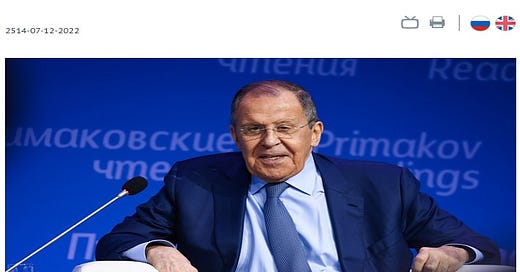Russia Officially Declared That India Is At The Center Of The Emerging Multipolar World Order
Foreign Minister Lavrov’s assessment is the most accurate one thus far of any foreign figure outside of India itself, which proves just how well Russia understands that country and how much it appreciates its newfound role.
Russian Foreign Minister Lavrov declared during his appearance at last week’s Primakov Readings International Forum that “In a natural way, India is one of the countries that not only aspires to be, but is at the essence of the forming of a multipolar world as one of its most important poles.” This followed his prior praise of that South Asian state for refusing to join the US’ alliances against Russia and China, which in turn came after President Putin praised Indian Prime Minister Modi and the Indian people.
That top diplomat’s assessment is the most accurate one thus far of any foreign figure outside of India itself, which proves just how well Russia understands that country and how much it appreciates its newfound role. Late last month, it was reported that Russia requested that India scale its exports by a whopping five times, with External Affairs Minister Jaishankar subsequently confirming the spirit of this proposal but clarifying that relevant discussions far predated his partner’s special operation in Ukraine.
Returning back to Lavrov’s appearance at last week’s event, it also deserves mentioning that he reaffirmed Russia’s support for India’s aspiration to become a permanent member of the UNSC. He later added that India is among those countries that “have more reasons to become an equitable member of the multipolar world than the EU.” This is a sensible assessment especially considering that he began his speech by praising India’s role in the RIC framework that he credits with catalyzing multipolar processes.
The origins of the global systemic transition to multipolarity can be traced back to the mid-1990s when former Foreign Minister Primakov first conceptualized RIC prior to putting it into practice exactly as Lavrov reminded everyone, but relevant processes were unprecedentedly accelerated as a result of this year’s special operation and all that came afterwards. India’s masterful response to this chaos led to it becoming a globally significant Great Power, the details of which can be read in the preceding hyperlink.
The purpose of pointing that out in the context of this analysis is to explain why Lavrov thinks so highly about that country’s contemporary role in International Relations. As he put it, “India is currently one of the leading countries in terms of economic growth, maybe even the leader. Its population will soon be bigger than that of any other country. New Delhi has vast diplomatic experience in settling various kinds of problems, as well as authority and a reputation in its region.”
All of this is true, especially the economic data that he cited as proven by the OECD’s report late last month, which showed that India grew at twice the pace of China over the past year. Its chairmanship of the G20 will also imbue it with an unparalleled opportunity to lead the Global South and thus make progress on its grand strategic goal of assembling a new Non-Aligned Movement (“Neo-NAM”) for creating a third pole of influence that’ll break the Sino-American bi-multipolar superpower duopoly.
Lavrov declared in his speech that “We are endeavouring to accelerate [multipolar] processes”, which can be interpreted in the larger context as referring to Russia’s full support for India’s rise as a globally significant Great Power that indisputably changed the course of International Relations this past year. Their special and privileged strategic partnership is therefore among the most important engines of the emerging Multipolar World Order, which all objective observers must finally acknowledge.




